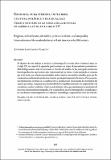Por favor, use este identificador para citar o enlazar a este item:
http://hdl.handle.net/10261/180046COMPARTIR / EXPORTAR:
 SHARE
BASE SHARE
BASE
|
|
| Visualizar otros formatos: MARC | Dublin Core | RDF | ORE | MODS | METS | DIDL | DATACITE | |

| Título: | Regiones, subalternos, invisibles, cultura política y desigualdad. Crisis y retorno de lo social en la historia de América Latina en el siglo XX |
Otros títulos: | Regions, subordinates, invisibles, political culture, and inequality. Crisis and return of the social in the history of Latin America in the 20th century | Autor: | Santamaría García, Antonio CSIC ORCID | Palabras clave: | Historiografía Historia Social Historia Política New Cultural Estudies Siglo XX Historia Económica Historia Cultural Subalternos Postcolonial Studies Deconstructivismo Giro Lingüístico Historia de Género Microhistoria Desigualdades Nueva Historia Política Historia Revisionismo |
Fecha de publicación: | 2019 | Editor: | Colegio de San Luis | Citación: | http://dx.doi.org/10.21696/rcsl9182019879 | Resumen: | The paper analyzes recent historiography on Latin America in the 20th century, especially that grouped generically around postmodern thought. Methodologically, it is structured according to analysis of the main historiographical trends, more representative contributions and its criticism, and as a result it shows that there has been a radical methodological effort that has renewed the historiography, but that has generated a dispersion in knowledge that requires synthesis. Logically, its limitations lie in the breadth of the contributions analyzed, the vastness of the space they deal with, further compounded by a multitude of national historiographies, and its originality lies in the consistency with the results; synthesis and critique in order to evaluate the results of a vast historiographical renovation. Because it is a historiographical essay, the finding and conclusions are implicit in the objective, methodology and originality and value of the article. El objetivo de este trabajo es analizar la historiografía reciente sobre América Latina en el siglo XX, en especial la agrupada genéricamente en torno al pensamiento posmoderno. Metodológicamente, está estructurado en función del análisis de las principales tendencias historiográficas, las aportaciones más representativas y su crítica. Como resultado, se constata que se ha hecho un esfuerzo metodológico radical que ha renovado los estudios, pero que ha ocasionado una dispersión en el conocimiento que requiere ejercicios de síntesis. Por esa razón, sus limitaciones estriban en la amplitud de las aportaciones examinadas, la enormidad del espacio que tratan, compuesto por multitud de historiografías nacionales. Su originalidad es la consistencia con los resultados: el ejercicio de síntesis y crítica para justipreciar los resultados de una vasta renovación historiográfica. Por tratarse de un ensayo historiográfico, los hallazgos y las conclusiones están implícitos en el objetivo, metodología, originalidad y valor del artículo. |
Versión del editor: | http://dx.doi.org/10.21696/rcsl9182019879 | URI: | http://hdl.handle.net/10261/180046 | ISSN: | 1665-899X |
| Aparece en las colecciones: | (EEHA) Artículos |
Ficheros en este ítem:
| Fichero | Descripción | Tamaño | Formato | |
|---|---|---|---|---|
| Regiones, subalternos.pdf | Artículo | 439,99 kB | Adobe PDF |  Visualizar/Abrir |
| Bibliografia Historia de America Latina en el siglo XX con especial referencia de los New Cultural, Subaltetms and Postcolonial Studies.pdf | Bibliografía | 219,9 kB | Adobe PDF |  Visualizar/Abrir |
CORE Recommender
Page view(s)
474
checked on 21-abr-2024
Download(s)
186
checked on 21-abr-2024
Google ScholarTM
Check
NOTA: Los ítems de Digital.CSIC están protegidos por copyright, con todos los derechos reservados, a menos que se indique lo contrario.
